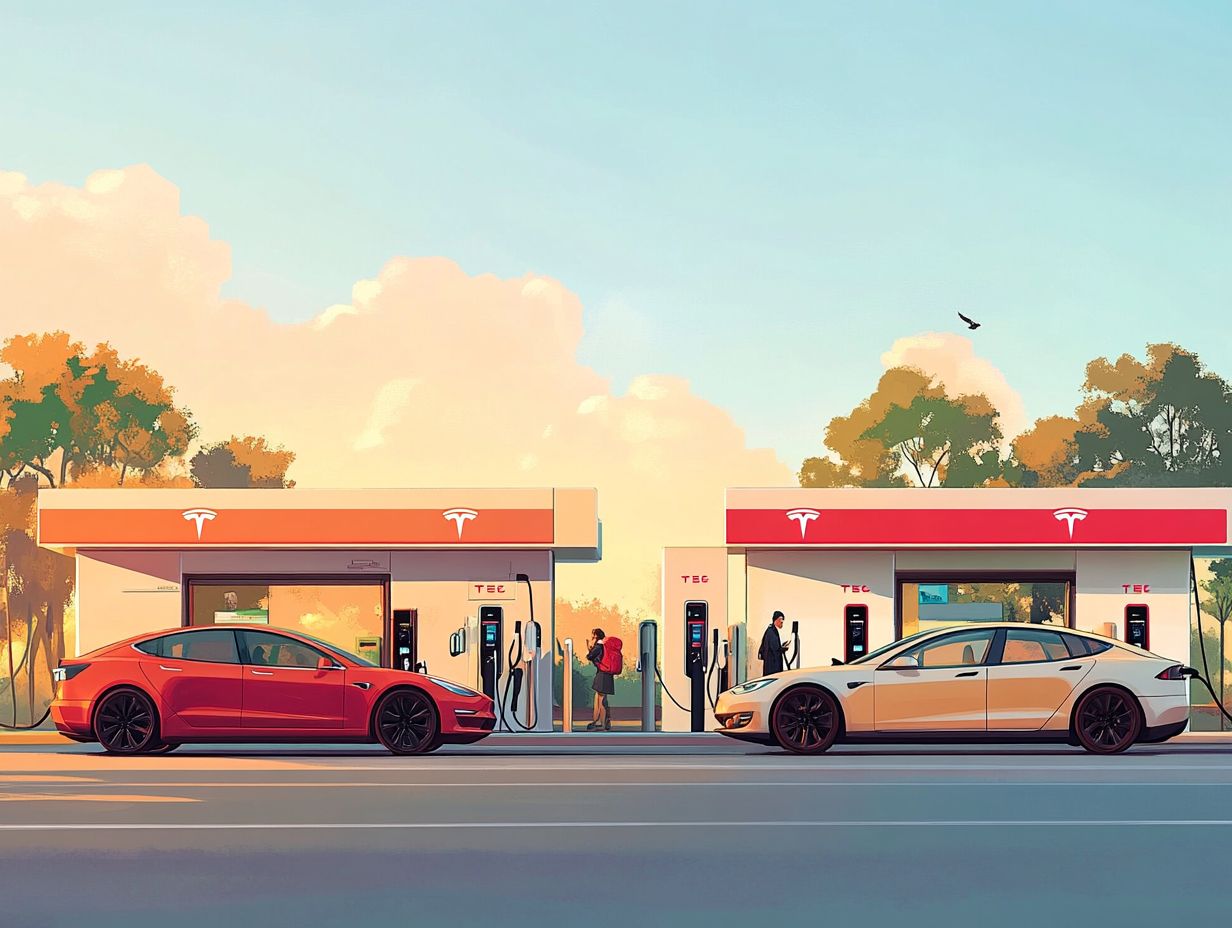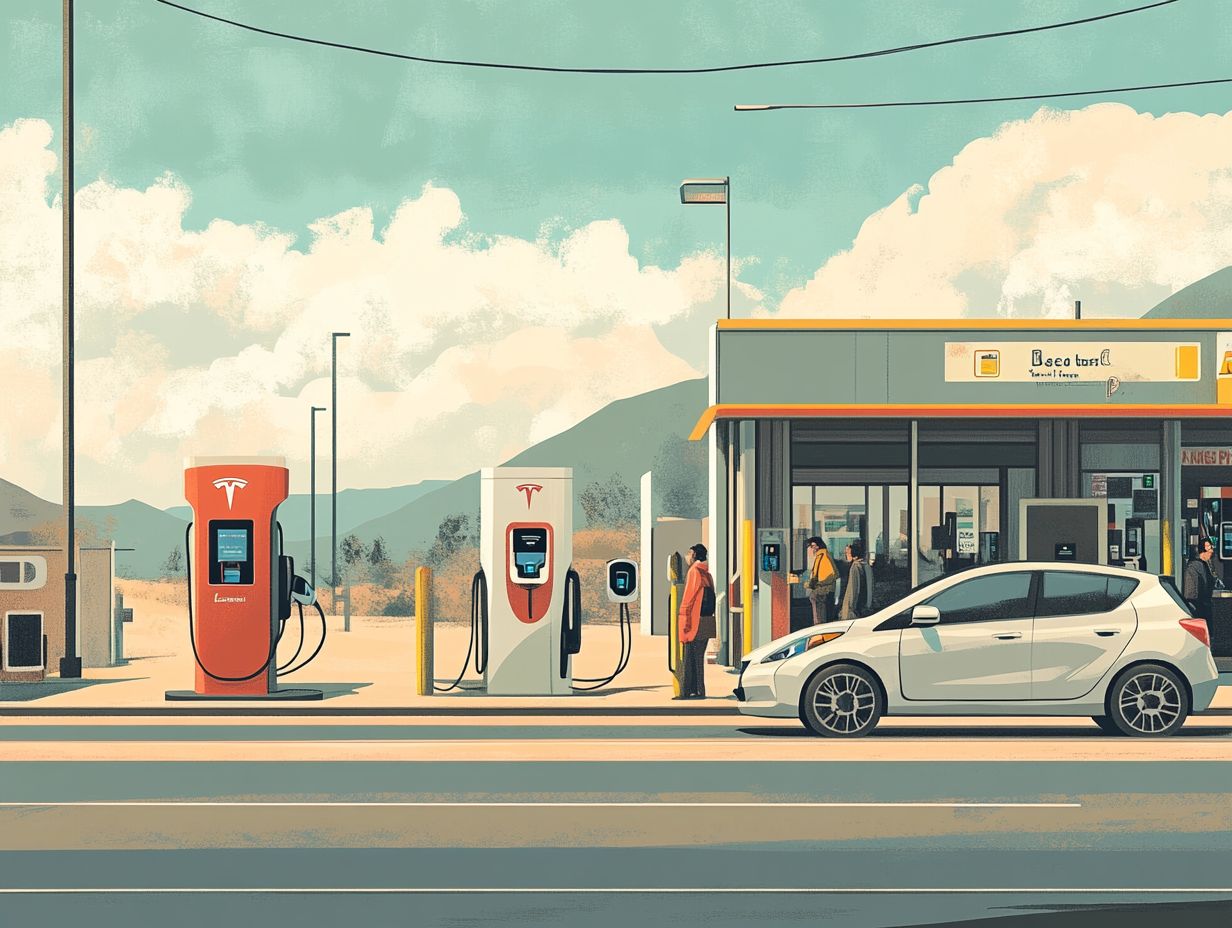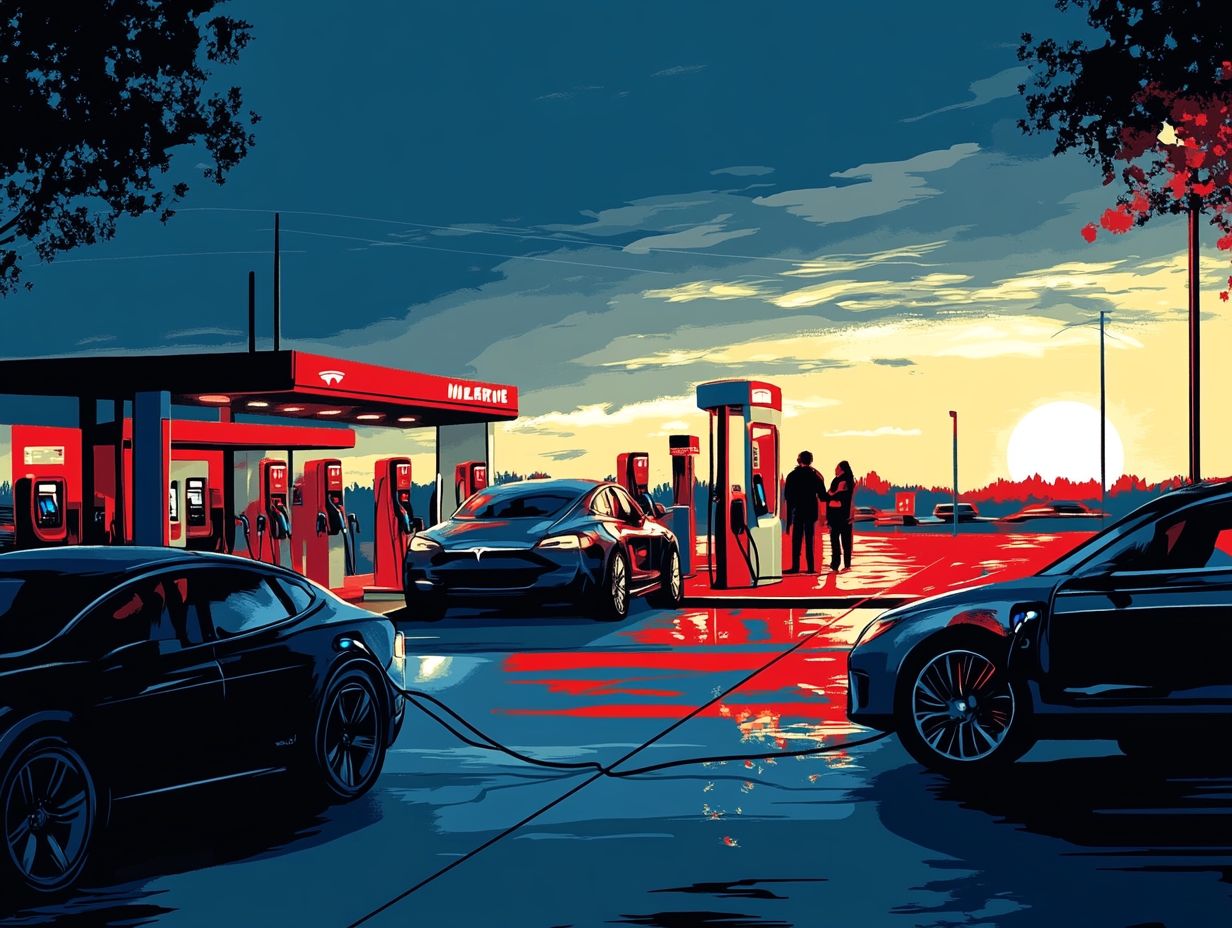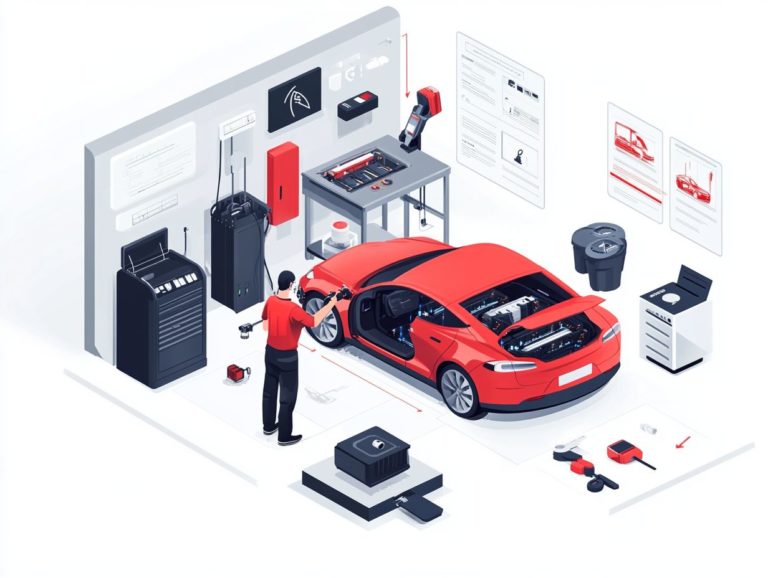The Impact of Oil Prices on EV Sales
The relationship between oil prices and electric vehicle (EV) sales is more complex than it may seem. As global oil prices fluctuate, they significantly influence consumer behavior, government policies, and strategies employed by EV manufacturers.
This article explores various factors affecting EV sales, detailing both direct and indirect consequences of oil price changes. By analyzing historical trends and presenting future predictions, it aims to equip manufacturers and consumers with valuable insights as they navigate this changing landscape.
Contents
- Key Takeaways:
- What Drives EV Sales?
- Impact of Oil Prices on EV Sales
- Case Studies of Oil Price Fluctuations and EV Sales
- Future Predictions and Projections
- Strategies for EV Manufacturers and Consumers
- Frequently Asked Questions
- What is the impact of oil prices on EV sales?
- How do oil prices affect consumer behavior towards EVs?
- Are lower oil prices always bad for EV sales?
- How do fluctuations in oil prices affect the overall EV market?
- What role do government policies play in the impact of oil prices on EV sales?
- Are there any long-term effects of oil prices on EV sales?
Key Takeaways:

- Fluctuations in oil prices directly impact electric vehicle sales; lower oil prices typically decrease EV sales, whereas higher prices can boost them.
- Government incentives, technology advancements, and consumer preferences also influence EV sales, but the effect of oil prices is significant.
- EV manufacturers and consumers must adapt to changing oil prices by diversifying product portfolios and staying aware of potential price fluctuations.
Understanding the EV and Oil Market Connection
The relationship between electric vehicles (EVs) and the global oil market is complex. As EV sales rise, they challenge oil demand, especially in the transportation sector, which has historically relied on fossil fuels.
This shift toward cleaner technologies is not just a trend; it aligns with global climate goals aimed at reducing carbon emissions and promoting sustainable energy solutions. The growth of renewable energy sources and advancements in battery technology are driving a significant energy transition, challenging traditional oil consumption patterns.
This transformation extends beyond vehicles; it represents a broader movement prioritizing environmental sustainability over outdated energy sources. The surge in EV adoption reflects heightened consumer awareness and supportive government policies advocating for greener alternatives.
Automakers are investing heavily in electric infrastructure, enhancing the appeal and accessibility of these vehicles. This paradigm shift could redefine energy consumption globally, compelling oil-producing nations to reevaluate long-term strategies.
As reliance on fossil fuels diminishes, the implications for both the economy and climate could be profound. This change fosters demand for cleaner energy solutions and sparks discussions about the future of the oil industry.
What Drives EV Sales?
Several key factors influence your decisions when purchasing electric vehicles, from personal preferences to government policies aimed at encouraging adoption. The electric vehicle market is evolving, with factors such as declining battery costs and the expansion of charging infrastructure playing a vital role.
Incentives for consumers also significantly shape buying choices. As you prioritize sustainability, the demand for electric vehicles continues to surge.
Other Influencing Factors
Along with government policies and incentives, advancements in battery technology and critical infrastructure investments significantly influence interest in electric vehicle (EV) sales. As sustainability becomes a priority in purchasing decisions, the demand for EVs grows.
Technological advancements in lithium batteries commonly used in EVs for their efficiency extend the range of these vehicles and speed up charging times, addressing major concerns for potential buyers. The electric vehicle market is transforming as automakers respond to consumer preferences by broadening electric offerings and enhancing vehicle performance.
These factors create a synergistic effect, reinforcing the trend toward electrification and reshaping the landscape of EV sales in the coming years.
This is an exciting time for electric vehicles! Stay updated on trends and explore your options to make informed choices that align with your values.
Impact of Oil Prices on EV Sales

The impact of fluctuating oil prices on electric vehicle (EV) sales is crucial. Changes in these prices can greatly influence gasoline consumption and affect transportation demand.
As oil prices rise, consumers typically seek more economical alternatives, often leading to increased interest in electric vehicles. This shift can displace some of the demand for fossil fuels, marking a significant trend in the market.
Direct and Indirect Effects
Oil prices significantly affect your EV purchasing decisions, influencing both individual choices and the broader market environment.
When fuel costs spike, you ll likely want to reconsider your reliance on fossil fuels, nudging you toward more sustainable transportation options. Growing awareness of the need to reduce pollution from cars makes high oil prices a powerful catalyst for shifting perspectives.
Rising costs promote a cultural shift toward environmentally conscious choices. The market’s perception also plays a vital role; positive narratives about electric vehicles can spark your interest, leading to increased sales and a deeper commitment to cleaner alternatives.
Case Studies of Oil Price Fluctuations and EV Sales
Examining case studies of oil price fluctuations provides invaluable insights into how these changes have historically influenced EV sales and market trends. Reports from the International Energy Agency reveal that previous spikes in oil prices correspond with significant increases in EV adoption rates, highlighting the relationship between fossil fuel costs and the growth of clean technology.
Examining Past Trends
A close examination of past trends shows that oil price volatility consistently influences EV sales. Historical data indicates spikes in EV adoption during periods of high oil prices.
This relationship underscores a broader economic principle: as you face soaring fuel costs, it s natural to see electric vehicles as a cheaper option for your transportation needs.
Consider notable time frames, like the significant price surges in 2008 and again in 2014; these instances clearly demonstrate how market anxieties driving fuel prices can push you toward electrification. Analyzing these patterns offers valuable insights into current consumer behavior amidst fluctuating oil prices, playing a critical role in forecasting future EV sales and market dynamics.
Ultimately, understanding these correlations helps stakeholders craft strategies and equips policymakers to create supportive infrastructures that promote sustainable growth.
Future Predictions and Projections

Future predictions regarding electric vehicle sales suggest you should brace for a notable shift in oil demand. The global market is adapting to evolving consumer preferences and technological advancements.
Insights from the International Energy Agency indicate that as EV adoption rates increase, a significant reduction in oil consumption within the transportation sector is highly probable. This shift points toward a transformative energy landscape that you ll want to keep an eye on.
In summary, the intricate relationship between oil prices and electric vehicle sales is vital for understanding market dynamics. As consumers increasingly turn to electric vehicles, it s essential to stay informed about these trends and consider how they might affect your choices in transportation.
Explore electric vehicles today, and consider how your choices can contribute to a more sustainable future.
Experts’ Opinions and Forecasts
Experts believe that ongoing advancements in technology and supportive policies will be crucial in shaping future oil consumption patterns in the electric vehicle market.
As you observe the rising demand for electric vehicles (EVs), driven by innovations in battery technology and a growing consumer focus on sustainability, many industry analysts predict a significant transformation in the car market. This shift is expected to have major implications for the oil industry, as consumption declines with more drivers choosing cleaner alternatives. Incentives and regulations aimed at reducing carbon emissions are likely to further propel this transition.
As a result, reliance on fossil fuels may decrease, prompting a gradual realignment of the energy sector. In this new landscape, renewable sources will gain greater importance, reshaping not only transportation but also the way energy is produced and utilized on a global scale.
Strategies for EV Manufacturers and Consumers
As the electric vehicle market evolves, it’s essential to adapt strategies in response to fluctuating oil prices and advancements in battery technology. By aligning with these changes, navigating challenges from shifting market dynamics becomes more manageable.
Adapting to Changing Oil Prices
Adapting to the shifting tides of oil prices is crucial, whether you’re an EV manufacturer or a consumer keen on seizing opportunities in the electric vehicle market!
To effectively maneuver through these fluctuations, consider advocating for manufacturers to invest in research that identifies market trends and evolving consumer preferences. This ensures they can create vehicles that resonate with eco-conscious buyers.
Staying up-to-date with the latest technologies, such as improved batteries, helps manufacturers enhance battery efficiency and improve charging infrastructure, ultimately making electric vehicles more accessible and appealing.
As a consumer, staying informed about local incentives for electric vehicle adoption is key. Engaging actively in discussions surrounding sustainability enriches your understanding and fosters a deeper appreciation for innovations. This teamwork leads to a sustainable future for all.
Frequently Asked Questions

What is the impact of oil prices on EV sales?
The impact of oil prices on EV sales is significant. As oil prices increase, consumers are more likely to consider purchasing an electric vehicle, making it a more cost-effective option compared to traditional gas-powered vehicles. Understanding the impact of EVs on the economy can further illuminate this shift in consumer behavior.
How do oil prices affect consumer behavior towards EVs?
Oil prices have a direct influence on consumer behavior towards EVs. When oil prices are high, consumers are more likely to switch to electric vehicles due to potential cost savings on fuel. However, when oil prices are low, consumers may be less inclined to consider purchasing an EV.
Are lower oil prices always bad for EV sales?
No, lower oil prices may not always have a negative impact on EV sales. While it may decrease the cost savings incentive for consumers, it can also lead to a decrease in the production cost of EVs, making them more affordable.
How do fluctuations in oil prices affect the overall EV market?
Fluctuations in oil prices can significantly impact the overall EV market. When oil prices are unstable, it can create uncertainty for consumers making large purchase decisions, potentially leading to a decrease in EV sales.
What role do government policies play in the impact of oil prices on EV sales?
Government policies can play a critical role in the impact of oil prices on EV sales. Policies such as tax incentives and subsidies can offset the higher upfront cost and incentivize consumers to switch to electric vehicles, regardless of oil prices.
Are there any long-term effects of oil prices on EV sales?
Yes, there can be long-term effects of oil prices on EV sales. As more countries and governments aim to reduce their reliance on fossil fuels and promote eco-friendly solutions, the demand for EVs may continue to increase, regardless of fluctuations in oil prices.
Learn more about how EVs can benefit you today!






